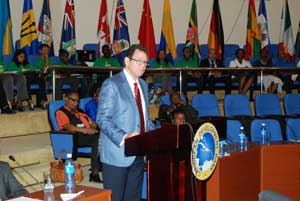–at end of fruitful 44th Board meet
THE 44th Annual Meeting of the Board of Governors of the Caribbean Development Bank (CDB) ended on a high note yesterday at the Guyana International Convention Centre (GICC), with CDB President, Dr. Warren Smith expressing the Bank’s recommitment to the process of regional integration.This commitment to the process of regional integration had been underscored by President Donald Ramotar and Finance Minister Dr. Ashni Singh on Wednesday.
In his address at the opening of the CDB meeting, President Ramotar had challenged the Bank to address several areas he described as quintessential to ensuring development of the region’s competitive advantage with a

focus on regional integration.
Dr. Singh had echoed similar sentiments, in underscoring the need to work more urgently and concertedly to restore faith in regionalism; pride in regional identity; and enthusiasm for the regional enterprise.
Cognisant of those appeals, the CDB President yesterday said: “We heard the repeated calls from yourself and the other governors for a recommitment to regionalism, and we also sensed your infectious enthusiasm for the regional enterprise.
“We concur with these sentiments, and will play our part in designing and implementing regional approaches, especially in areas such as climate change, including renewable energy; transportation; taxation; and economic and social statistics.”
The CDB President said the organisation’s management agreed that the Bank should sharpen its focus on a limited number of key priority areas in going forward. Those areas are consistent with CDB’s comparative advantage and operational capacity.

At the 44th meeting, governors, for the second consecutive year, participated in a roundtable discussion intended to provide guidance to the Bank’s management in crafting the entity’s strategic plan for the 2015-2019 cycle.
Management also provided an update on the implementation status of measures agreed during the 2013 Governors’ Roundtable.
Smith also acknowledged concerns raised about the Bank’s internal capacity and the status of its internal reforms. He said: “Governors will be pleased to know that, over the past year, the Bank accelerated the recruitment of staff in key areas, such as internal audit, evaluation, energy, risk, and communication.
“The recruitment process is continuing apace, with a focus on strengthening capacity, particularly in the Operations Area.
“Similarly, reasonably good progress is being made in our reform agenda. Governance and accountability mechanisms have been strengthened, and transparency and disclosure policies are being operationalised.
“Governors have spoken loudly and frequently over these four days about the need to vigorously pursue internal reforms in all of (their) aspects. Even though much has already been done in this regard, management intends to deepen and accelerate the process over the next year.”
The CDB President appealed for the “customary support and encouragement” from the Bank’s Governors and Directors as it manages the difficult but necessary reform process.
Smith also addressed issues relating to the CDB’s credit rating, risk management, sovereign debt, and financial sector crisis.
Finance Minister Dr. Ashni Singh, the CDB’s outgoing Chairman of the Board of Governors, underscored the identification of areas of challenges and priorities going forward, as a major success for the assembly.
“The Bank has served us well,” he posited.
ENCOURAGING STRIDES
At the end of the meeting, the CDB elected a new Board Chairman, Prime Minister of St. Kitts and Nevis, Dr. Denzil Douglas.
He said: “I am indeed encouraged by the strides the Bank has made over the past several months to implement the reform agenda.
“More specifically, I find it most pleasing to learn of the improved credit rating of the Bank, a direct result of hard work and focused attention. The truth is that the reform agenda has been set for some time now, and it is time for delivery. There is no shortage of good plans and good intentions.
“…over the next twelve months, I intend to do my part to push forward the agenda for change.
“The performance of the Bank is central in tackling the major issues related to competitiveness; to renewable energy and high electricity costs; to the increasing threats posed by climate change; (and to) achieving sustainable growth, arresting high unemployment, and breathing new life into the elusive goal of private sector development.”
Dr. Douglas made it clear that for all borrowing and non-borrowing member countries, CDB is a trusted partnership which must be put to work alongside the many other strengths of the Bank which have repeatedly been referred to time and time again.
Next year, the CDB Board of Governors Meeting will be held in St Kitts and Nevis. In May of each year, the Board of Governors of the Caribbean Development Bank (CDB) holds the Bank’s Annual Meeting in one of its 27 member countries. This is normally a week-long event comprising seminars, workshops, and two days of formal meetings attended by the institution’s governors, most of whom are prime ministers, ministers of finance, or other high level authorities of the member countries.
The governors used the opportunity to review the Bank’s operations, and to undertake an assessment of its performance relative to its agreed mandate and goals.
The Caribbean Development Bank is a regional financial institution that was established in 1970 for the purpose of contributing to the harmonious economic growth and development of the member countries in the Caribbean.
Nineteen regional borrowing member countries, three regional non-borrowing member countries, and five non-regional, non-borrowing member countries comprise the Bank’s clientele.
(By Vanessa Narine)



.jpg)








